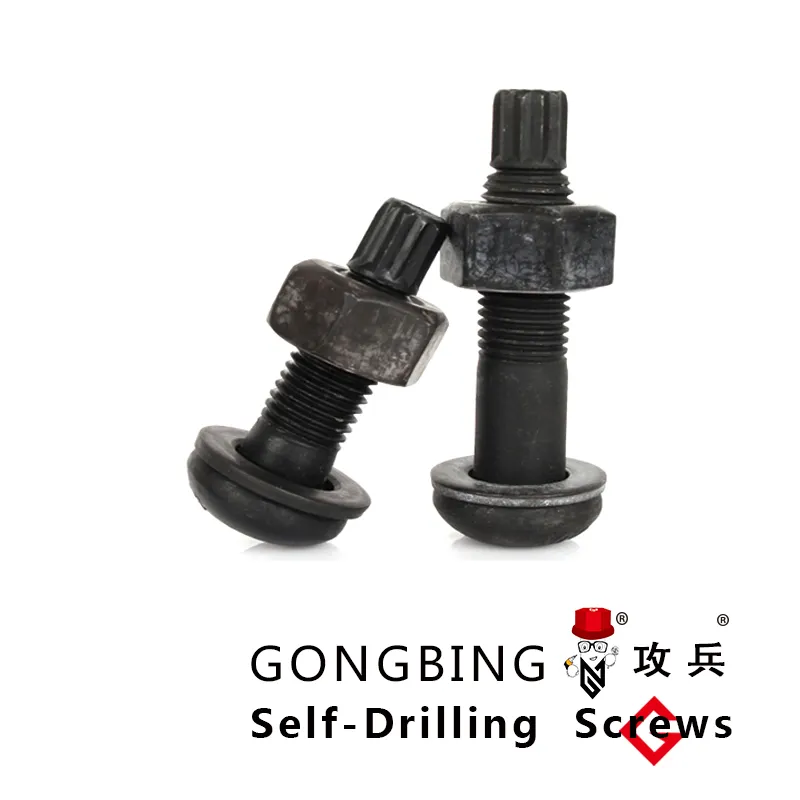Corrosion-Resistant Coatings for Structural Bolts in Marine Environments
Marine environments pose unique challenges for construction materials, particularly those exposed to saltwater, humidity, and fluctuating temperatures. Among the most critical components requiring protection are structural bolts, types of structural fasteners, and metal deck fasteners. Without proper corrosion resistance, these elements can degrade rapidly, compromising the integrity of entire structures. This article explores the importance of advanced coatings for marine applications, offering insights into selecting the right solutions for durability and safety.

The Critical Role of Corrosion Resistance in Structural Bolts
Structural bolts are the backbone of many marine constructions, from bridges to offshore platforms. Their primary function is to hold heavy loads and maintain structural stability. However, in marine environments, saltwater accelerates oxidation, leading to rust and weakening of the bolt’s tensile strength. Corrosion-resistant coatings act as a barrier, shielding the metal from corrosive elements.
Common coatings include hot-dip galvanizing, which applies a thick zinc layer to prevent moisture contact, and stainless steel alloys (e.g., Grade 316), renowned for their chromium content that forms a passive anti-corrosion film. For extreme conditions, epoxy or polymer coatings add an extra layer of chemical resistance. By investing in these treatments, engineers ensure structural bolts retain their strength and longevity, even in harsh coastal climates.
Exploring Types of Structural Fasteners for Marine Applications
Types of structural fasteners vary widely, each serving specific roles in marine projects. Beyond structural bolts, these include screws, rivets, and anchors, all of which require tailored corrosion protection.
Hex Bolts: Often used with pre-drilled holes, these benefit from zinc-aluminum coatings to resist pitting.
Anchor Bolts: Embedded in concrete, they require dual protection—coated shafts and waterproof sealants.
High-Strength Screws: Smaller but critical, these may use ceramic-infused coatings for abrasion resistance.
Choosing the right coating depends on the fastener’s material, exposure level, and load-bearing requirements. For instance, stainless steel fasteners are ideal for permanent installations, while galvanized options suit temporary structures. Understanding these nuances ensures optimal performance across all types of structural fasteners.
Metal Deck Fasteners: Combating Saltwater Challenges
Metal deck fasteners secure flooring and roofing in marine settings, where they face constant exposure to moisture and salt spray. Unlike standard fasteners, they must withstand both mechanical stress and environmental wear.
Powder-coated metal deck fasteners are popular for their aesthetic appeal and resistance to chipping. However, in submerged or splash zones, thermal-sprayed aluminum (TSA) coatings offer superior protection by bonding metallurgically to the base metal. Additionally, duplex coatings—combining galvanizing and epoxy—provide a two-tier defense against corrosion and UV damage.
Proper installation is equally vital. Over-tightening can crack coatings, creating entry points for moisture. Using torque-controlled tools and regular inspections ensures metal deck fasteners remain intact and functional for decades.
FAQs About Corrosion-Resistant Coatings for Structural Bolts
What advantages do corrosion-resistant coatings offer for structural bolts?
Coatings like hot-dip galvanizing or epoxy extend the lifespan of structural bolts by preventing rust and chemical degradation. This reduces maintenance costs and prevents structural failures, ensuring safety in marine environments.
How do types of structural fasteners influence coating choices?
Different types of structural fasteners face varying stress levels and exposure. High-strength bolts may need thicker zinc coatings, while screws in hidden areas might prioritize epoxy for chemical resistance. Customizing coatings based on application maximizes protection.
Can coated metal deck fasteners survive prolonged saltwater exposure?
Yes. Advanced options like TSA or duplex coatings are engineered for submerged conditions. These create impermeable barriers, allowing metal deck fasteners to endure decades of saltwater contact without corroding.
Do coated structural bolts require special maintenance?
Routine inspections are recommended, but high-quality coatings minimize upkeep. Simply rinsing with fresh water to remove salt deposits can prolong their effectiveness.
Why invest in premium coatings for types of structural fasteners?
Premium coatings prevent costly replacements and downtime. By protecting every bolt, screw, and anchor, they ensure the entire structure remains secure, compliant, and resilient against marine challenges.
In marine environments, the right corrosion-resistant coatings are non-negotiable for structural bolts, types of structural fasteners, and metal deck fasteners. By understanding the unique demands of each component and selecting tailored solutions, engineers and builders can safeguard their projects against the relentless forces of nature. Investing in advanced coatings today means building a legacy of durability and safety for tomorrow.
-
Weatherproof Plastic Expansion Anchors for OutdoorXəbərlərJun.06,2025
-
Sustainability in the Supply Chain: Eco-Friendly TEK Screws ProductionXəbərlərJun.06,2025
-
Load-Bearing Capacity of External Insulation FixingsXəbərlərJun.06,2025
-
Double Head Bolts: Enhancing Efficiency in Industrial MachineryXəbərlərJun.06,2025
-
Corrosion Resistance in Chipboard Screws: Coatings for Wholesale DurabilityXəbərlərJun.06,2025
-
Butterfly Toggle Bolts : Enhancing Structural ResilienceXəbərlərJun.06,2025
